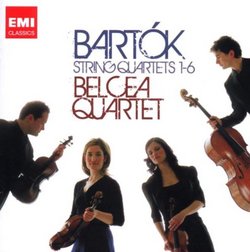| All Artists: Bela Bartok, Belcea Quartet Title: Bartok: String Quartets 1-6 Members Wishing: 0 Total Copies: 0 Label: EMI Original Release Date: 1/1/2008 Re-Release Date: 2/5/2008 Album Type: Enhanced Genre: Classical Styles: Chamber Music, Historical Periods, Classical (c.1770-1830) Number of Discs: 2 SwapaCD Credits: 2 UPC: 094639440023 |
Search - Bela Bartok, Belcea Quartet :: Bartok: String Quartets 1-6
 | Bela Bartok, Belcea Quartet Bartok: String Quartets 1-6 Genre: Classical Bartók's string quartets are a true cornerstone of quartet repertoire. They communicate on various levels and are supremely effective on all of them. Whether viewed as a cycle or as six individual works, they remain m... more » |
Larger Image |
CD Details
Synopsis
Album Description
Bartók's string quartets are a true cornerstone of quartet repertoire. They communicate on various levels and are supremely effective on all of them. Whether viewed as a cycle or as six individual works, they remain masterpieces of formal design, every bar plainly part of a rounded grand plan, a plan securely placed within a wider framework. They can be mysterious, intimate, innovative, outspoken or earthy, while the infinite subtlety of their workings warrants a lifetime's study, and praise. The vibrant, young musical ambassadors of the Belcea Quartet have been playing all of Bartók's quartets extensively in the last few months and they will continue to feature heavily in their UK tour schedule in 2008. Highlights include concert performances of the complete cycle at the Wigmore Hall and Edinburgh Festival. The Belcea's interpretation of these quartets really captures the listeners' attention, the quartet commented: "The more we immersed ourselves in these works, the more beauty and richness we discovered in them and we very much hope that this appeal will even still increase in future because we definitely consider these quartets to be the greatest masterpieces of the last century in our repertoire." The First Quartet is the most romantic in spirit and actually harbours a love story. It marks an affectionate withdrawal from a late Romantic fin-de-siècle. The Second (1915-1917) takes us some way towards the gritty, hard-hitting Bartók of the mid-late 1920s. By 1927 Bartók, a superb pianist by any standards, was enjoying a worldwide concert career, and soaking up what that world had to offer in musical terms. One probable influence was Alban Berg's Lyric Suite, an expressive masterpiece that thrives on a plethora of complexities. Bartók's Third Quartet does likewise, a work that on one level seems to mimic a Hungarian rhapsody (the alternation of fast and slow music) while on the other takes tiny thematic cells and develops them into a teeming nest of musical activity. Bartók's next two quartets are both cast unconventionally in five movements of a symmetrical, arch-like design. The Fourth (1928) has at its centre an evocative though austere example of Bartók's 'night music' that opens with a rhapsodic cello solo leading in turn to imitated birdsong. The Fifth Quartet (1934) is built on a far larger scale. Bartok modifies the arch form by placing a scherzo at its centre, a syncopated dance movement in Bulgarian rhythm, framed by two slow movements using similar chord sequences. The air of ineffable sadness that hangs over Bartók's last quartet (1938) reflects not only a swiftly sickening Europe but personal tragedy: his mother's journey towards death would end in December 1939. All four movements open with the same, heart-rendering 'mesto' (sad) motto. Never has a quartet cycle ended quite so equivocally, or sounded a truer warning, one that even today inspires both awe and gratitude.
Similar CDs
| David Bowie Let's Dance Genres: Alternative Rock, Pop, R&B, Rock, Classic Rock Label: EMI/Capitol | |
| Vampyrouss A Dark Desire Genre: Metal Label: Casket | |
| Various Artists True to the Game Genres: Pop, Rap & Hip-Hop Label: Stadium Ent | |




